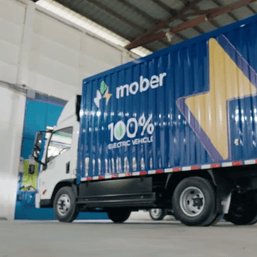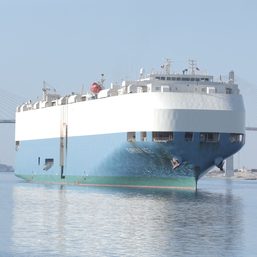SUMMARY
This is AI generated summarization, which may have errors. For context, always refer to the full article.

STOCKHOLM, Sweden – Global shipping rates rose sharply and companies scrambled to avoid disruption to shipments after attacks on vessels in the Red Sea on Tuesday, December 19, stymied traffic through the key Suez Canal trade artery.
Recent attacks by Iran-aligned Yemeni Houthi militant group on vessels forced leading shipping companies including Maersk to reroute around the Cape of Good Hope to avoid the Suez Canal, the shortest shipping route between Europe and Asia.
The attacks have stirred memories of 2021 when container ship Ever Given ran aground in the canal, blocking dozens of container ships for six days.The current disruption has caused container shipping costs to rise sharply, but those rates are still far below peak pandemic levels.
Electrolux, the world’s largest appliance company, has set up a task force to find alternative routes or identify priority deliveries, while Inter IKEA warned of potential product shortages.
As of Tuesday, the price to ship a container from China to the Mediterranean was $2,413, having risen 44% in December due to the disruptions, after hitting a low of $1,371 earlier this year, said Eytan Buchman, chief marketing officer at Freightos, a booking and payments platform for international freight.
However, that rate still falls far short of the pandemic era high in January 2022 of $14,158, when shipments of goods were delayed by months due to lack of available container vessels. With worldwide economic demand softening, particularly in China, ship owners haven’t been able to fill ships with containers.
Electrolux said late on Monday, December 18, that it expects any effect on deliveries will be limited. The Swedish group has worked with shipping companies such as Maersk and CMA CGM.
In a statement on Tuesday, Inter IKEA said it was looking at alternative transportation options to the canal, a key route for the budget furniture maker.
“The situation in the Suez Canal will result in delays and may cause availability constraints for certain IKEA products,” it said.
The canal accounts for about 12% of the world’s shipping traffic.
Defense Secretary Lloyd Austin said on Tuesday the United States was leading a multinational operation to safeguard commerce in the Red Sea.
Extra $1 million
The longer journey will cost up to $1 million extra in fuel for every round trip between Asia and Northern Europe, according to estimates from freight platform Xeneta.
Retailers and manufacturers will likely pass on the higher costs to consumers, potentially boosting inflation during a prolonged cost-of-living crisis.
“This is a cost that will ultimately be passed on to consumers who are buying the goods,” said Peter Sand, chief analyst at Xeneta.
Traveling via southern Africa will add about 10 days to a journey from Asia to North Europe and the East Mediterranean, experts said. It typically takes about 27 days to sail from Shanghai in China to the Dutch port of Rotterdam.
On Monday, US fertilizer company Mosaic said it had rerouted a couple of US-bound shipments around the Cape of Good Hope.
Dairy giant Danone said most of its shipments had been diverted, increasing transit times. Should the situation continue beyond two to three months, the group will activate mitigation plans, including using alternate routes via sea or road wherever possible, a spokesperson said.
Walmart, the largest US importer via container ships, declined comment.
Delays to shipments will not affect Christmas holiday shopping, but there is the potential for shops to run low on stock by February if the delays continue, supply chain research firm Project44 said in a note on Tuesday.
“After the peak shopping season through the holidays, it is possible that inventories will be depleted,” it said. – Rappler.com
Add a comment
How does this make you feel?


![[ANALYSIS] Challenges affecting the cold chain industry](https://www.rappler.com/tachyon/2024/05/tl-cold-chain-industry-challenges.jpg?resize=257%2C257&crop_strategy=attention)







There are no comments yet. Add your comment to start the conversation.